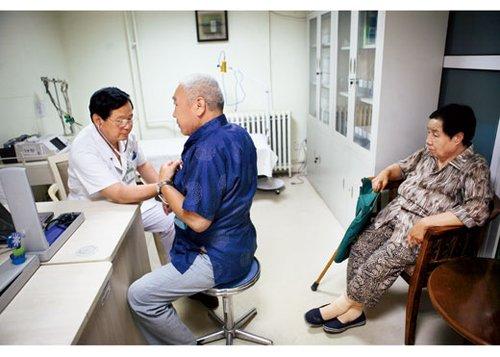| Videos | • Latest |
|
• Feature | • Sports | • Your Videos |
General practitioners vital in health care

 0 Comment(s)
0 Comment(s) Print
Print E-mail
CNTV, July 11, 2011
E-mail
CNTV, July 11, 2011
General practitioners often work long hours and go beyond the call of duty by making house calls to immobilized patients. Beijing started recruiting GP's 10 years ago to improve the quality of care at urban medical clinics. Zhao Yunjie explains how one such doctor is an indispensable part of her community.
Dr. Gao Xiuqin works a tight schedule every day.
As a community-based general practitioner in Beijing, Gao attends to her first patient at 7.30 am.
She also helps patients with a range of disabilities, including those with impaired hearing.
"Do you still remember the sign language song I taught last time? Let's sing it."
"You are writing about my home? That's very nice hand-writing."

Advising people on how to take care of their health is also part of her duty.
Li Yongrong, resident, said, "She comes regularly to advise us how to stay healthy. This includes telling us what medicines to take and how to take them if we have high blood pressure."
The community Dr. Gao works for many elderly residents, so she provides door-to-door service for their convenience.
"Is Mr. Liu at home?"
"Please come in, Dr. Gao."
"I'm here to take your blood-sugar level."
79-year-old Mr. Liu suffers from diabetes and chronic heart disease. Dr. Gao has taken care of him for years. Her tireless efforts are greatly appreciated by Mr. Liu's family.
Gao Guangchen, son-in-law, said, "My wife and I are almost 60 years old. It's difficult for us to take care of my father-in-law. Dr. Gao help us a lot. Without her, we don't know what to do."
General practitioners like Dr. Gao are essential in the country's medical care system.
They are on call around the clock, providing peace of mind to their patients need.
But there are simply not enough of them.
China plans to have at least one GP like Dr. Gao for every 5-thousand residents, but current numbers are still well short of this goal.
Xiao Lixin, vice director of Health Bureau, Fengtai district, Beijing, said, "Fengtai has 1.8 million permanent residents, but there are only 27-hundred workers in community medical centers. Only 500 of these workers are general practitioners."
There are varying reasons for Beijing's shortage of general practitioners.
Community-based practitioners are still undervalued within the health care sector, earning much less than doctors at large hospitals.
But most importantly, community medical centers lack policy support.






Go to Forum >>0 Comment(s)